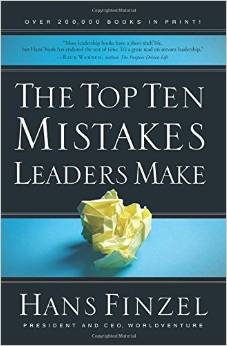I’m working my way through a book, The Top 10 Mistakes Leaders Make, by Hans Finzel, and I’m really enjoying the challenge. So for the next ten Saturdays I want to work through these ten mistakes, knowing that they apply to CEOs, ministry leaders, parents, teachers, coaches, pastors and just about anyone in any kind of leadership role.
I promise to keep my summaries short(ish), and I would love to interact with your thoughts as we go along. These mistakes are listed in order of how they occur in the book, not necessarily how I would arrange them. Overboard Leadership requires an honest self-evaluation of each of these shortcomings (sins?) of leaders. Looking for missed posts, click here: Mistake #1, Mistake #2, Mistake #3, Mistake #4, Mistake #5, Mistake #6, Mistake #7).
-----
Mistake #8: Missing the clues of corporate culture
Hans defines corporate culture as “the way insiders behave based on the values and group traditions they hold.” In other words, the changes (some subtle, some not-so-much) you and your spouse, or you and your roommate, made in order to live in the same house without wanting to beat each other senseless...is learning to live within a corporate culture.

As you look around at your life, you are probably part of several cultures, many without you even being aware! Sports team parent? Definitely a soccer mom culture! Married? Definitely bringing two family cultures together into one (and creating a third culture in your own family!). Are you employed? Then you know there is a culture at your office! Do you attend church? Then you definitely know about organizational culture! Every town, every state, every region has a culture and we learn to live and work and build relationships based on what those cultures value.
Finzel points out that culture is at the heart of success for a business (and I would say for a relationship, family or ministry!) and that top performing companies have “strong cultures [that] support the mission, goals, and strategy of the organization.” For believers, our culture should promote excellence in every aspect of our lives, living out 1 Corinthians 10:31 and Colossians 3:17. Those verses remind us to do everything to the glory of God, even mundane every-day-tasks like eating, drinking and speaking should be done with our very best effort!
When it comes to leading people, a good leader seeks to learn the culture of his environment, and then operates and strengthens the organization from within that culture. When cultural shifts need to be made, a good leader has done her homework to understand the existing culture, and makes careful, calculated moves before instituting changes.
The culture of your family or ministry or business, can be discovered by exploring the non-negotiable beliefs that drive it. Everyone has preferences that come and go, sometimes connected to a particular person, sometimes a particular trend or the latest book, but those preferences won’t help your organization sink or swim. The values under those preferences, the do-or-die beliefs that drive the organization, those are the items that define your culture.
Some churches value, not changing. Whether it’s expressed or not, the leaders of this particular type of church are always suspicious of change, and typically like the “old way” of doing things. Some businesses value quality over quantity, and others mass-produce parts and value production numbers over anything else. Some families value a tight-knit unit with very little outside influence, others open the house doors wide for anyone or anything to enter! Some dads value their work over their families. Some moms put their children first, even above their spouse. All of these beliefs represent the underlying culture of a particular group of people.
A good leader seeks to understand that decisions her organization is making, come from these underlying core beliefs. Finzel (quoting Joules and Posner) writes, “Leaders who understand their own value, and can articulate them well to their organization, have proven to show superior performance in their roles.” Here are six benefits to leaders who learn to embrace an organization’s culture:
- Strong feelings of personal effectiveness
- Promotes high levels of company loyalty
- Facilitates consensus about key organizational goals
- Encourages ethical behavior
- Reduces levels of job stress
- Promotes strong norms about caring and working hard
(From the book: The Leadership Challenge)
When leaders don’t learn their organization’s culture, they create conformers (just do what you must to survive), complainers (completes work without enjoying it, and impacts other employees with negativity), Innovators (let’s change things!), ritualists (going through the motions), retreatists (running away from every situation) and rebels (angry non-conformists).
Good leaders spend time learning the culture, embracing the culture that promotes the vision and goals of the organization and carefully changing the parts of culture that need adjustment. If you’re leading an organization and running into constant conflict, check out chapter eight of Hans’ book for some great tips about understanding the culture.
Go ahead and take the plunge, your leadership will be better on the water!
Mistakes leaders make (9/10)
